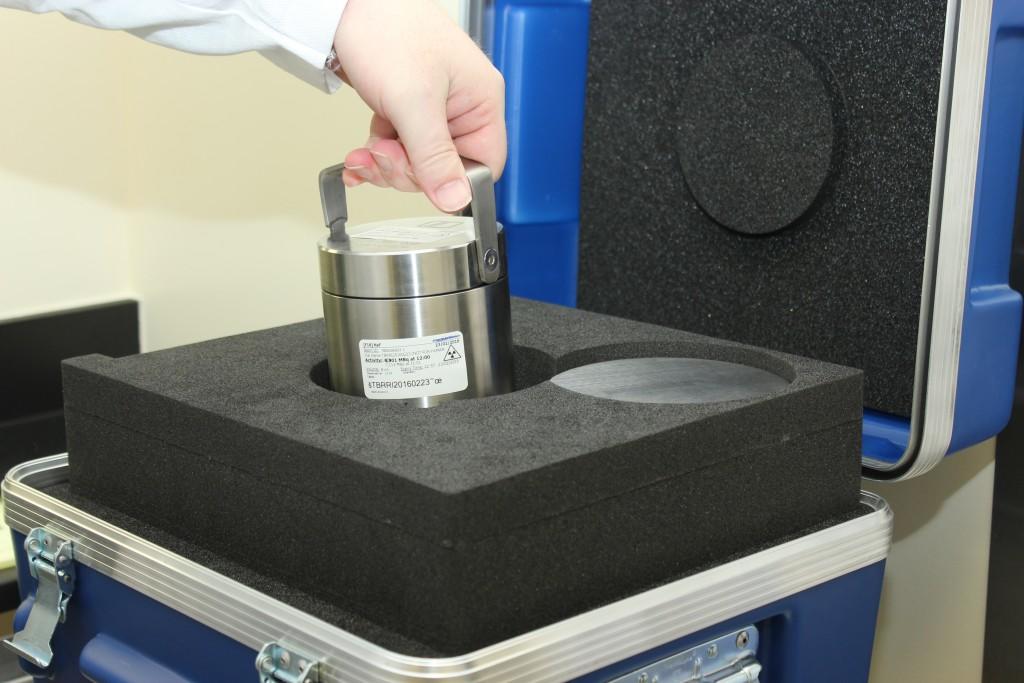Special Delivery: First Locally Produced Isotopes Arrive at Thunder Bay Regional Health Sciences Centre
by Marcello Bernardo
 Tuesday, February 23rd marked the first time that a batch of locally produced Fluorine-18 isotopes was delivered to the hospital to be used for calibration of the PET-CT scanner.
Tuesday, February 23rd marked the first time that a batch of locally produced Fluorine-18 isotopes was delivered to the hospital to be used for calibration of the PET-CT scanner.The Nuclear Medicine team at Thunder Bay Regional Health Sciences Centre (TBRHSC) received a special delivery this week from their next door neighbour, the Cyclotron.
Tuesday, February 23rd marked the first time that a batch of locally produced Fluorine-18 isotopes was delivered to the hospital to be used for calibration of the PET-CT scanner.
The calibration is a preventative maintenance procedure that is conducted four times a year by the Nuclear Medicine team. They inject the F18 isotopes into a device called a phantom which simulates the tissue in a human body. The phantom is then scanned by the PET-CT to ensure that the isotopes will “light up” properly if they were being used on a real patient to detect cancer cells.
“The cyclotron offers us the ability to produce our own isotopes for clinical use in patient care. It also opens doors for research into the development of new treatments and offers financial advantages,” says Jean Bartkowiak, President and CEO of TBRHSC and CEO of the Thunder Bay Regional Research Institute (TBRRI).
Producing isotopes locally will only be 25% of what it would cost to order them from another facility. There are also plans to sell isotopes to other medical facilities.
Dr. Mike Campbell, Director of Cyclotron Operations at TBRRI, admits that while this was a very exciting milestone, the best is yet to come.
“There are still a few steps needed to make Fluorodeoxyglucose and other medical isotopes here in Thunder Bay for patient use but today was definitely one to remember and big step in the right direction,” says Campbell. “You can compare this process to the first expedition to the moon. We aren’t quite at Apollo 11 yet, ready to walk on the moon, but more like the Gemini Missions where we take all the pieces we have developed and test them together to making sure they work perfectly. That way, when we can take that next step, it will be the giant leap we are all looking for — providing the medical isotopes our patients need.”
On February 19th the facility received its full license to operate from the Canadian Nuclear Safety Commission (CNSC). This follows close to a year of commissioning and testing of all the radiation safety and production systems and an inspection from the CNSC. The cyclotron staff is now working on the Health Canada applications necessary to show that TBRRI and TBRHSC can produce radiopharmaceuticals that are safe for patient use.
The cyclotron will have many benefits to economic development and research in our community. However the production and use of isotopes at TBRRI and TBRHSC illustrate the benefit it will have on direct patient care.
“We will soon have a secure and reliable supply of isotopes for use in cancer care,” says Nadine Doucette, Board Chair for TBRHSC. “No longer will a patient arrive in Thunder Bay having travelled from a remote community in the region to learn that the plane carrying the isotopes didn’t arrive and they should go home and re-schedule the appointment. They will be treated locally, with less expensively produced isotopes that will guarantee the care when and where they need it.”
A significant portion of the critical funding for the cyclotron was provided through the Thunder Bay Regional Health Sciences Foundation’s Exceptional Cancer Care campaign. Donors in the community contributed $2.2M to the project, helping to bring this leading-edge piece of medical and research equipment to Thunder Bay. Generous support was also provided by FedNor, the Northern Ontario Heritage Fund Corporation (NOHFC) and the City of Thunder Bay. Without the support of these partners and the contribution from donors, this project would never have happened.
For more information, please contact:
Marcello Bernardo
Communications Officer
Communications, Indigenous Affairs, and Engagement
Thunder Bay Regional Health Sciences Centre
(807) 684-6765
bernarma@tbh.net